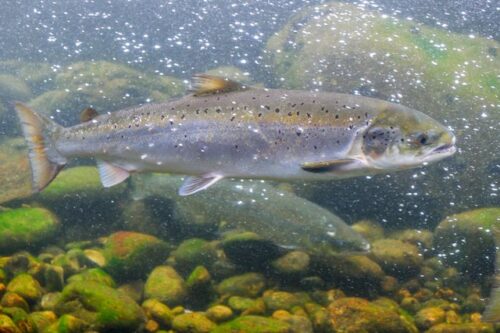Scots innovators clean up with detergents made from salmon farm waste.
Start-up company Eco Clean Team is working on a pioneering research project to develop a new process to make surfactants, one of the main components in detergents and other industrial and institutional cleaning products.
The founders say the new bio-based process, developed by researchers at the University of St Andrews, is more cost- effective, efficient and eco-friendly than traditional methods of producing the valuable chemical compounds.
The next stage of development will ensure the novel method is replicable, straightforward to implement and allows the products to be manufactured in high volumes.
According to The Scotsman, The initiative builds on the success of a feasibility study that was jointly funded by the Industrial Biotechnology Innovation Centre (IBioIC) and Sustainable Aquaculture Innovation Centre in 2020.

Sustainably
Now Eco Clean Team has been awarded a six-figure sum from the IBioIC to take the project forward.
“I was born and grew up in Tarbert, Loch Fyne, so aquaculture and fishing are close to home for me and I have seen first-hand the importance of both to communities in Scotland,” said Eco Clean Team co-founder and director Mark Hamilton.
“However, as the sector grows it needs to do so sustainably, and we believe this project is just one example of a new valuable solution that can come from its by-products.
“While working on a project for the development of a new cleaning product, I began to look at how one of the core ingredients could be produced in a more sustainable way.
“This developed into the project Eco Clean is working on today.
A critical step
“This next stage in our research represents a critical step in the process of development then scaling up the production of our sustainable surfactant.”
“We have already proved the feasibility in a previous study and hope that, by the end of this project, we will find ourselves closer to full-scale commercialisation and seeing the surfactant used in a range of industrial and selected household products.”
Scotland’s aquaculture sector currently produces around 192,000 tonnes of Atlantic salmon each year, as well as sea trout, other fish and shellfish. There are plans to grow the market, increasing annual production to around 350,000 tonnes by 2030.
Salmon is the country’s top food export, worth around £450 million to the economy.
By-products
The sector is working to reduce and reuse its by-products – for example, in the formulation of biodiesel.
Dr Alfredo Damiano Bonaccorso, senior research fellow at the University of St Andrews, has been experimenting with uses for fish by-products for some time.
He said: “This project with Eco Clean is an excellent case study of how research can help a novel company to develop an idea by transferring insight and knowledge from academia to industry.”
Liz Fletcher, director of business engagement at IBioIC, added, “Bio- based alternatives to petrochemicals will be an essential part of meeting global sustainability targets, and there are wide-ranging opportunities to use natural feedstocks that one industry might consider by-products as the building blocks for new products and chemicals.”

